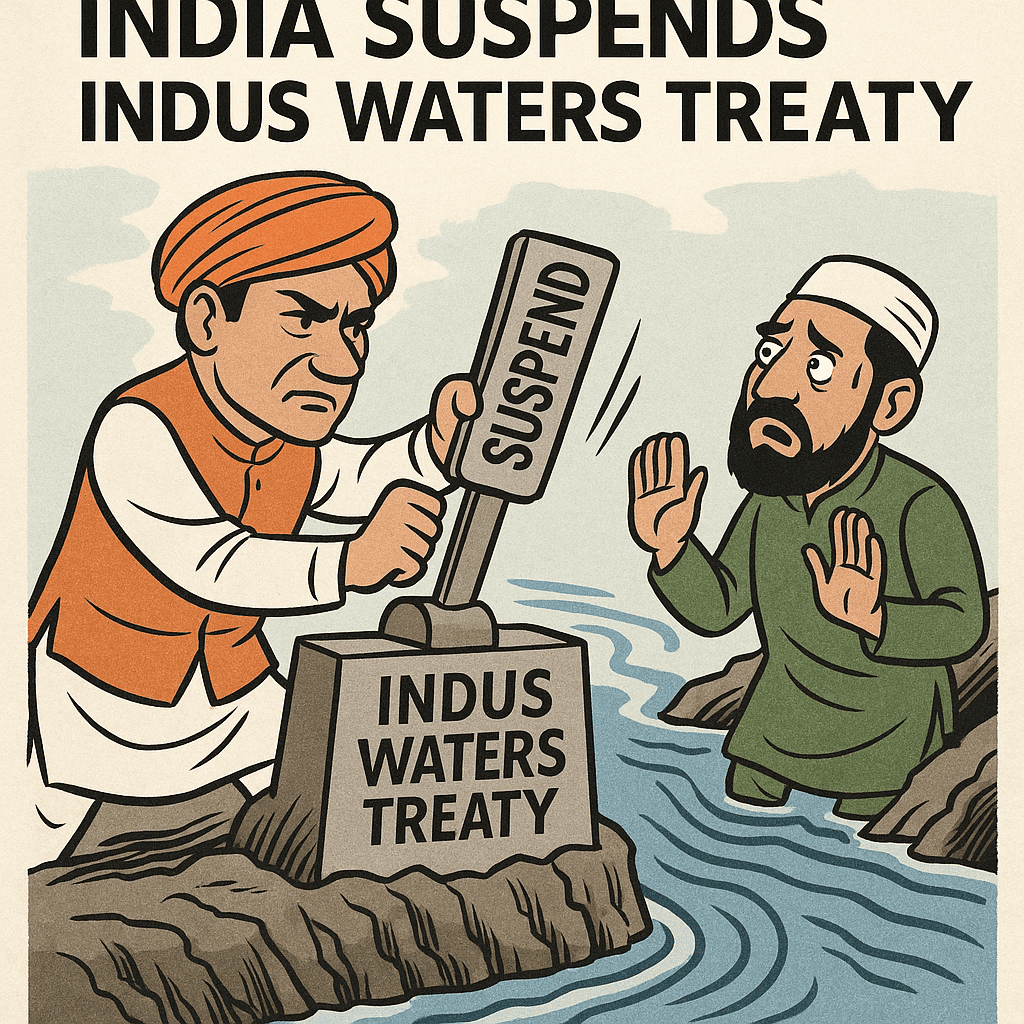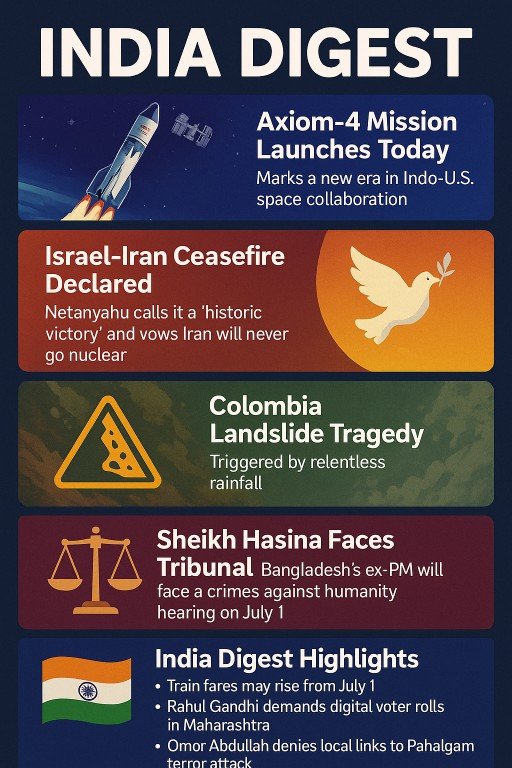India Suspends Indus Waters Treaty: Strategic Implications and Policy Options
Background
On April 23, 2025, India announced the suspension of the Indus Waters Treaty (IWT), a pivotal water-sharing agreement with Pakistan, in response to a deadly terrorist attack in Pahalgam, Jammu and Kashmir, which resulted in the deaths of 26 civilians, including 24 Indian tourists, one Nepali national, and a local guide. The attack, claimed by a previously unknown group named Kashmir Resistance, has been attributed by Indian authorities to cross-border terrorism originating from Pakistan. YouTube+11Politico+11The Guardian+11The Guardian+4AP News+4Politico+4
The IWT, brokered by the World Bank and signed in 1960, has been a cornerstone of India-Pakistan relations, surviving multiple conflicts between the two nations. It allocates the waters of the six rivers of the Indus basin between the two countries, granting India control over the eastern rivers (Ravi, Beas, and Sutlej) and Pakistan control over the western rivers (Indus, Jhelum, and Chenab), with certain provisions for India’s use of the western rivers. AP News
India’s Rationale for Suspension
India’s decision to suspend the IWT is rooted in its assertion that Pakistan continues to support cross-border terrorism, thereby violating the spirit of the treaty. Foreign Secretary Vikram Misri stated that the treaty would remain suspended until Pakistan “credibly and irrevocably abjures its support for cross-border terrorism.” Business News & Finance+2The Indian Express+2AP News+2
This move is part of a broader set of retaliatory measures, including the downgrading of diplomatic ties, closure of the Attari-Wagah border crossing, and revocation of visas issued to Pakistani nationals. AP News+2Wikipedia+2The Indian Express+2
Legal and Diplomatic Considerations
The IWT does not contain provisions for unilateral suspension; Article XII stipulates that the treaty can only be modified or terminated by mutual agreement. Therefore, India’s suspension raises questions about its adherence to international legal norms. Pakistan has condemned the suspension as “cowardly” and “inappropriate,” asserting that it undermines a long-standing framework for cooperation. Wikipedia+2Dawn+2Wikipedia+2The Economic Times
Strategic Options for India
In the wake of the suspension, India has several strategic avenues:
- Maximizing Use of Eastern Rivers: India can expedite projects like the Shahpur Kandi Dam and the Ujh Multipurpose Project to fully utilize its share of the eastern rivers, enhancing irrigation and hydropower generation.
- Developing Infrastructure on Western Rivers: While respecting the treaty’s provisions, India can pursue non-consumptive uses (e.g., hydroelectric projects) on the western rivers, such as the Kishanganga and Ratle projects, to assert its rights and capabilities.Wikipedia
- Engaging in Diplomatic Efforts: India can leverage international forums to highlight Pakistan’s alleged support for terrorism, seeking to build global consensus and pressure.
- Reevaluating Treaty Provisions: India may advocate for a renegotiation of the treaty to address contemporary challenges, including climate change and evolving geopolitical dynamics.
Implications for Pakistan
The suspension poses significant challenges for Pakistan, which relies heavily on the Indus basin for agriculture and drinking water. Any disruption could exacerbate water scarcity and economic instability. The Times of IndiaThe Express Tribune+1The Times of India+1
Conclusion
India’s suspension of the Indus Waters Treaty marks a significant shift in its approach to bilateral relations with Pakistan, intertwining water diplomacy with national security concerns. For IAS aspirants, this development underscores the importance of understanding international treaties, transboundary water management, and the interplay between diplomacy and security.
Further Reading:
- What India’s suspension of the Indus Waters Treaty means for Pakistan — and for itself
- India suspends Indus Waters Treaty, shuts Attari border in strong response to Pakistan
- Indus Waters Treaty in abeyance after Pahalgam attack: What does this mean?
Mains Practice Question:
Q: Analyze the implications of India’s suspension of the Indus Waters Treaty on regional stability and bilateral relations with Pakistan. Discuss the legal and strategic dimensions of this decision.
The suspension, as reported by The Hindu on April 23, 2025, follows years of diplomatic gridlock, terror concerns, and India’s objections to Pakistan’s repeated references of the treaty in international forums.
What is the Indus Waters Treaty?
- Signed: 1960, between India and Pakistan, with the World Bank as a guarantor.
- Scope: Division of the six rivers of the Indus basin.
- India: Full rights over the Eastern Rivers – Ravi, Beas, Sutlej.
- Pakistan: Rights over the Western Rivers – Indus, Jhelum, Chenab, with India allowed “non-consumptive” use (e.g., hydropower).
Despite wars and political tensions, the treaty endured for over six decades — seen globally as a model for transboundary water sharing.
Why Did India Suspend the Treaty?
According to strategic experts cited in The Hindu, the decision is not abrupt, but the result of:
- Pakistan’s misuse of treaty mechanisms to internationally shame India.
- Delayed resolution mechanisms, with India losing patience over protracted arbitration processes.
- Growing terror threats and lack of trust, which erode the foundation of any cooperative agreement.
India had earlier issued a notice for modification of the treaty in January 2023, demanding renegotiation within 90 days. That deadline passed without progress.
Strategic Options for India Post-Suspension
Experts note that India still holds a variety of options that comply with international law while leveraging its upper-riparian status:
1. Maximize Use of Eastern Rivers
- Fully utilize its entitlement under the IWT by:
- Building more storage facilities.
- Accelerating pending hydropower projects like Shahpur Kandi, Ujh, and 2nd Ravi-Beas link.
2. Expedite Hydropower Projects on Western Rivers
- Continue development under non-consumptive clauses, respecting treaty norms but asserting India’s rights.
3. Review or Exit Treaty (Extreme Measure)
- Vienna Convention on the Law of Treaties permits withdrawal in case of material breach — India can argue repeated cross-border terror attacks constitute such a breach.
- However, this risks international backlash, especially from China and neutral global players.
4. Water Diplomacy with Neighbors
- Engage in bilateral and multilateral talks with Pakistan and other stakeholders to seek a new water-sharing regime.
Implications for India and Pakistan
For India:
- Opportunity to assert sovereign rights and set precedents for stronger water diplomacy.
- Challenge lies in managing international optics, especially with a World Bank-guaranteed treaty.
For Pakistan:
- Potential for water insecurity and domestic unrest.
- Pressure to seek alternate conflict-resolution strategies beyond internationalizing bilateral issues.
Conclusion
For IAS aspirants, the IWT suspension is a vital case study that intersects international law, environmental diplomacy, internal security, and strategic policymaking. India’s next moves will test its diplomatic finesse in balancing national interest with global perception.
Mains Answer Writing Tip
Q. India’s suspension of the Indus Waters Treaty marks a shift in its strategic approach towards Pakistan. Critically analyze.
Structure your answer as follows:
- Introduction – Brief on IWT and its historical importance.
- Body:
- Reasons for suspension.
- India’s strategic options.
- Legal and geopolitical implications.
- Conclusion – Balanced outlook on diplomacy vs national security.



